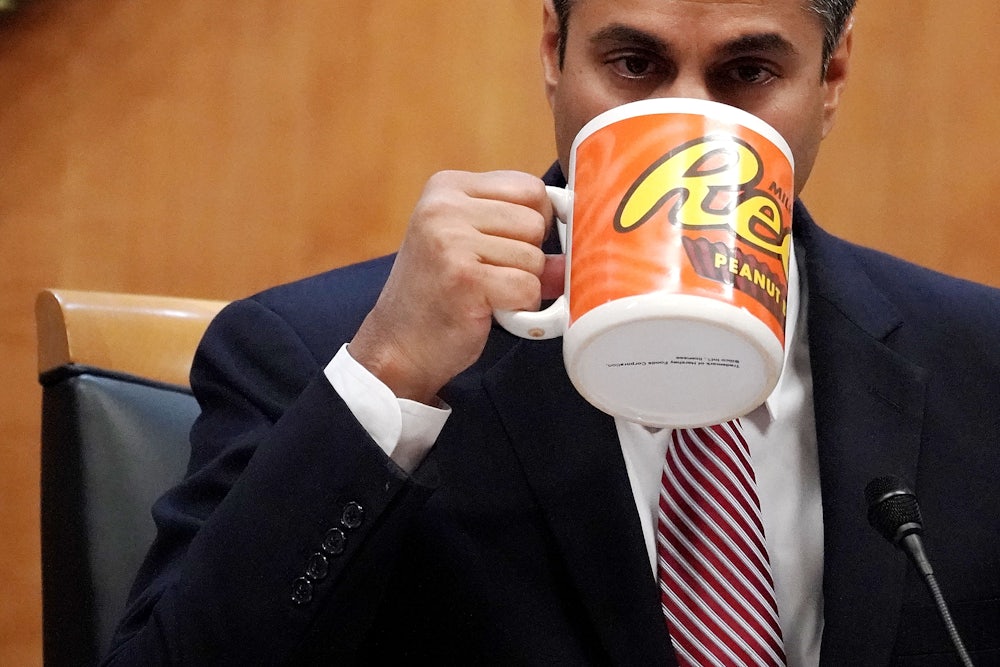Ajit Pai thinks net neutrality held us all back. It stifled innovation, he said. It deprived consumers of choices, starved rural communities of broadband, and even threatened the survival of the internet itself. Pai, who lobbied for Verizon before Barack Obama appointed him to the Federal Communications Commission, has prioritized the repeal of Obama-era net neutrality rules since becoming its chairman under President Donald Trump. Considering Pai’s background in the telecommunications industry, which has long wanted more control over how it delivers internet content, it makes sense that he has targeted the rules classifying internet service providers as Title II carriers, which subjected them to stricter regulation and prohibited providers from creating “fast lanes” that users could access for a fee. On Thursday afternoon, the FCC voted 3-2 to repeal the rules, and Pai killed his dragon.
“You can still drive memes right into the ground,” he joked in a Daily Caller video released ahead of the FCC vote. Pai’s jocularity, however, hides a more sinister truth: His war on net neutrality is an extension of the Trump administration’s war against the working class. His justifications are the same justifications put forward in any defense of deregulation, whether it’s in the financial industry or the oil and gas sector. The result is the same: More profits for companies, with dubious benefits for consumers. Corporations exist to make money, and making the internet as cheap and accessible as possible is not in their financial interests. They certainly are not in the business of making sure the people with the least disposable income, or who live the farthest away, can get internet access.
In conversations with The New Republic, net neutrality advocates expressed deep concern about the FCC’s vote. “You can’t even get a job at Walmart without having reliable internet access, let alone do a complicated homework assignment or find a great health care plan,” said Hannah Sassaman, policy director for the Media Mobilizing Project. “All of the basic pieces of dignity that most of us who have reliable and affordable internet take for granted go completely out the window without net neutrality.”
The impact on rural communities could be particularly severe. The FCC itself found in 2016 that 39 percent of rural Americans lack access to internet speeds of at least 25 Mbps. That figure increases to 41 percent for Americans living in tribal territory and it’s higher still—68 percent—for anyone living in rural tribal territory. “Without net neutrality rural residents will experience another form of systemic oppression and discrimination, I just know it,” said Dr. Jacquelyn Bragg, coordinator of the Community Economic Development Network of East Tennessee. “It is critically essential to economic development.”
Marty Newell, who coordinates rural broadband policies for the Center for Rural Strategies, rebuts one of Pai’s favorite arguments for repeal: that net neutrality made it more difficult to bring broadband access to rural communities. “There really is no data to show that net neutrality has had a significant impact, either for or against investment in broadband largely, or in rural places specifically. The numbers just don’t hold up when you look across the whole country,” Newell said, explaining that a “significant number” of rural communities can only access satellite telecommunications infrastructure, while some have only one provider. He added, “What our experience has been is the big cable providers only come to rural areas when someone holds their feet to the fire. The economic case is not as good as it is for more densely populated places.”
Rural people need broadband more than large providers need rural people. There simply aren’t a lot of potential customers located in isolated, often impoverished, communities.
Urban areas are better off, but accessibility gaps exist there too. “Poor and working people, particularly people of color, have a far, far more disproportionate lack of access to the internet than white communities,” Sassaman explained. “In Philadelphia, we have the third-worst internet access of any big city in the United States, behind Detroit and Memphis, both of which are cities that are also predominantly communities of color.”
The FCC’s deregulation push could, she added, force working class people to pay for internet access twice: once for basic access, and again for equitable access. That’s a direct challenge to social mobility. Not only would that complicate the process of applying for jobs or for college admission, it would also put an obstacle in the path of people trying to start their own businesses. The entrepreneurial spirit the GOP loves may not survive its deregulation campaign.
As the tech industry marches on, the internet will become entwined ever more deeply in our collective lives. It is a public space. It’s a place of protest; a market; even a university stand-in, for some. A stratification of the internet is a stratification of society, and the Obama administration’s decision to regulate the internet more like a public utility acknowledged that basic truth and sought to prevent its realization. (Though Obama was required to appoint a Republican commissioner, his decision to pick Pai in particular remains a mystery with damaging consequences.)
But with the Trump administration, stratification is its raison d’etre. From the tax reform bill winding its way through Congress, to the repeated attempts to repeal Obamacare, to the gutting of the Consumer Financial Protection Bureau, we see again and again policies that enrich the wealthy and lock the poor into an inferior class. The internet is simply the next frontier for it to conquer.
